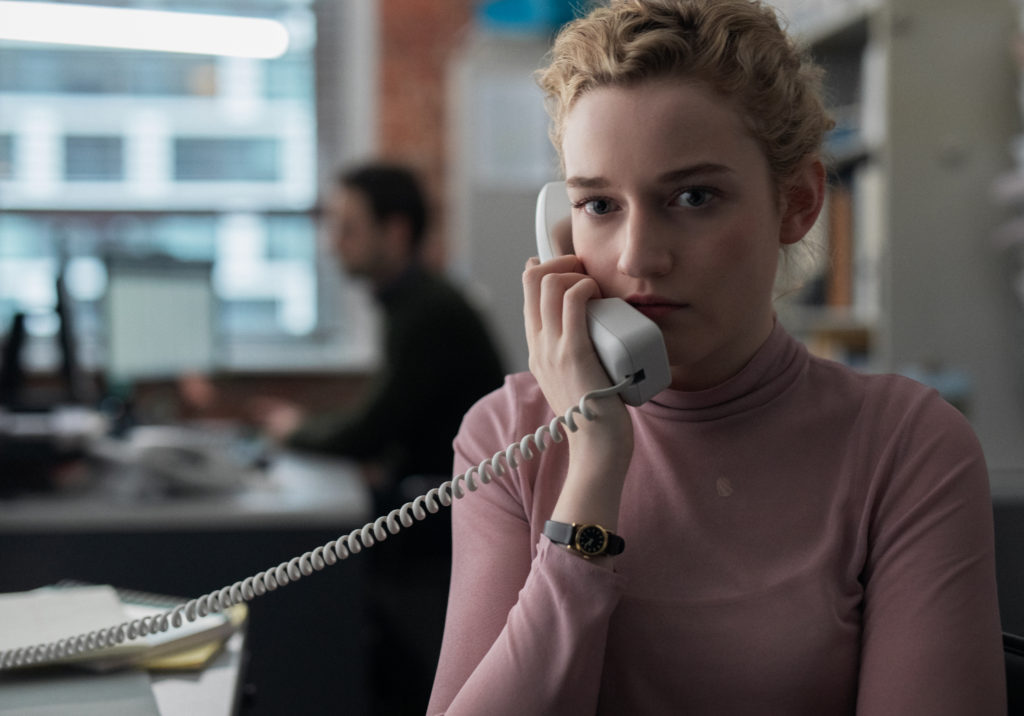Kitty Green is an award-winning Australian filmmaker. Her debut documentary feature, “Ukraine Is Not a Brothel,” explored a provocative feminist movement in Ukraine. After making its premiere at the Venice Film Festival in 2013, the film screened at more than 50 film festivals internationally and won the Australian Academy of Cinema and Television Arts (AACTA) Award for Best Feature Length Documentary. Green’s follow-up project, “The Face of Ukraine: Casting Oksana Baiul,” won the Short Film Jury Prize for nonfiction at the Sundance Film Festival. Her latest feature documentary, “Casting JonBenet,” was acquired as a Netflix Original, premiered at Sundance in 2017, and screened at the Berlinale before receiving the AACTA Award for Best Feature Length Documentary.
“The Assistant” will premiere at the 2020 Sundance Film Festival on January 24.
W&H: Describe the film for us in your own words.
KG: “The Assistant” depicts one day in the life of the youngest female assistant on the desk of a powerful and predatory film executive.
W&H: What drew you to this story?
KG: I was initially developing a project about consent and institutional power and had been interviewing college students across the United States. When the Harvey Weinstein story broke, I shifted focus and reached out to friends in the industry to hear their stories.
I spoke to assistants and executives at length from studios, companies, and agencies including employees of Miramax and The Weinstein Company and developed the screenplay with this research in mind.
W&H: What do you want people to think about when they are leaving the theater?
KG: Julia’s character is in such a complicated situation, and so are the women and men around her. I guess I’d be hoping that by seeing this machinery in action, an audience will come away thinking about their own role in this system or culture — we’re all part of it. And a cultural shift is aided by greater awareness.
W&H: What was the biggest challenge in making the film?
KG: Getting it funded.
W&H: How did you get your film funded? Share some insights into how you got the film made.
KG: My producers James Schamus and Scott Macaulay took this task on. This film was made completely independently. We were lucky to find a family of supporters—including 3311, Level Forward, and Cinereach—who understood what we were trying to achieve. We’ve also partnered with the New York Women’s Foundation who are doing incredible work with women-led organizations and are dedicated to making workplaces fair and equitable for all.
W&H: What inspired you to become a filmmaker?
KG: I’m not too sure. I was given a video camera as a gift when I was 11 and haven’t looked back since.
W&H: What’s the best and worst advice you’ve received?
KG: The worst advice: “Join Twitter.”
The best advice: “Get off Twitter.”
W&H: What advice do you have for other female directors?
KG: It sounds cliché but just get out there and make work with whatever tools you have. I took a DSLR with me whilst backpacking in Ukraine and ended up staying for a year and shot a feature documentary completely independently. That film really kickstarted my career.
W&H: Name your favorite woman-directed film and why.
KG: Chantal Akerman’s “Jeanne Dielman, 23 Commerce Quay, 1080 Brussels” is my favorite film. It was unlike I anything I had ever seen. Her focus on gesture and rhythm as well as her use of time to demonstrate the realities of domestic labor were a great influence on “The Assistant.”
W&H: What differences have you noticed in the industry since the #MeToo and #TimesUp movements launched?
KG: I think the system is changing but not fast enough. There’s been a definite shift in the culture. It is now easier for employees to speak up about discrimination and misconduct. That shift has been incredible. The system is still inherently structured against women though. We really need larger structural change if we want to see more women in power. That type of change takes time but is worth fighting for.







